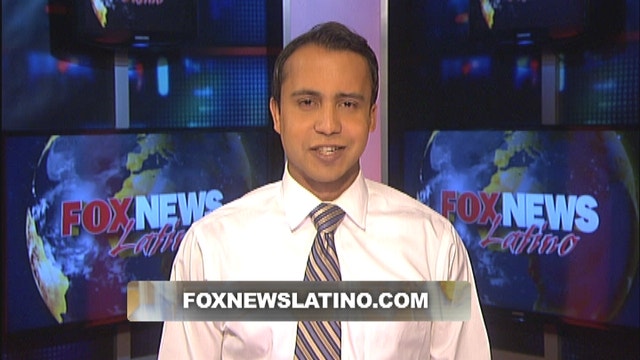In Lieu of Inauguration, Venezuelans Rally
Chavez’s inauguration has been indefinitely postponed due to the leader’s failing health from cancer but that won’t stop thousands from gathering.
Venezuela's government has organized what seems an alternative inauguration outside the presidential palace Thursday, the day the ailing ailing President Hugo Chávez was to be sworn in for a fourth term.
Vice President Nicolás Maduro urged supporters to gather on a street outside Miraflores Palace to demonstrate solidarity with Chávez, who remains in Cuba fighting complications after cancer surgery and hasn't spoken publicly or been seen in more than a month.
"Everyone to the street," Maduro said at a televised Cabinet meeting Wednesday night. "We're going to have a great function in honor of President Chávez."
Leaders from throughout Latin America and the Caribbean were invited, as they normally would be for a formal inauguration. President Jose Mujica of Uruguay arrived Wednesday, and other presidents expected to attend included Bolivia's Evo Morales and Nicaragua's Daniel Ortega.
Everyone to the street! We're going to have a great function in honor of President Chávez.
Maduro said heads of state, foreign ministers and other officials from 19 countries had come to Caracas. The vice president, whom Chávez designated his chosen successor last month, said that even though it wasn't an official swearing-in, Thursday's event still marks the start of a new term for the president following his re-election in October.
"A historic period of this second decade of the 21st century is starting, with our commander leading," Maduro said.
But glaring above all in the planned event was Chávez's absence from the presidential where he has so often spoken for hours on television, chided his opponents and called for a socialist revolution.
The opposition, limping from two recent electoral defeats, seems powerless to effectively challenge the postponement of Chávez's swearing-in, a legislative move that was endorsed Wednesday by a Supreme Court widely viewed as favoring the government.
Apparently clinging to life in Cuba, unable to travel home or speak publicly, Chávez remains fully and legally in power. The opposition has been left complaining that there are no independent institutions or courts inside Venezuela for them to appeal to, and the world appears to be giving a collective shrug to their plight.
The door to a court challenge was slammed by Supreme Court President Luisa Estella Morales even before the opposition could file one. Morales announced Wednesday that it was fine to delay the inauguration past the Jan. 10 date set by the constitution, saying the Supreme Court could handle the issue later, "at a time and place to be determined."
As for demands that, under the constitution, a caretaker should be named for the unseen president in Cuba, Morales said that so far, "there is not even a temporary absence."
Opposition leader Henrique Capriles condemned the high court's endorsement of delaying the inauguration. "Institutions should not respond to the interests of a government," he said at a news conference.
He said the opposition had urged various governments not to send representatives to Thursday's event, and said he was grateful to presidents who had decided not to come to Caracas.
Government officials are at pains to insist that Chávez remains in command, even if unheard from. Pro-Chávez politicians have been wearing T-shirts with an image of the president's eyes. New murals with Chávez's smiling face have gone up on city walls.
Maduro on Wednesday reiterated hopes of Chávez eventually returning. Still, the long silence by the dominant Venezuelan politician of the past 14 years has fed speculation that he could be near death, raising anxieties and tensions.
Military leaders have sought to show they are in step with Maduro and the government. They appeared alongside ministers at Wednesday night's Cabinet meeting. A military commander, Maj. Gen. Wilmer Barrientos, also spoke on television saying that the armed forces were "very pleased" with the court's decision and were focused on providing a "sense of peace and tranquility."
Chávez has been fighting an unspecified type of pelvic cancer since June 2011 and has undergone repeated surgeries, chemotherapy and radiation treatments.
Chávez said before his latest operation that if he were unable to continue as president, Maduro should take his place and run in an election to replace him.
Reporting by The Associated Press.
Follow us on twitter.com/foxnewslatino
Like us at facebook.com/foxnewslatino

























